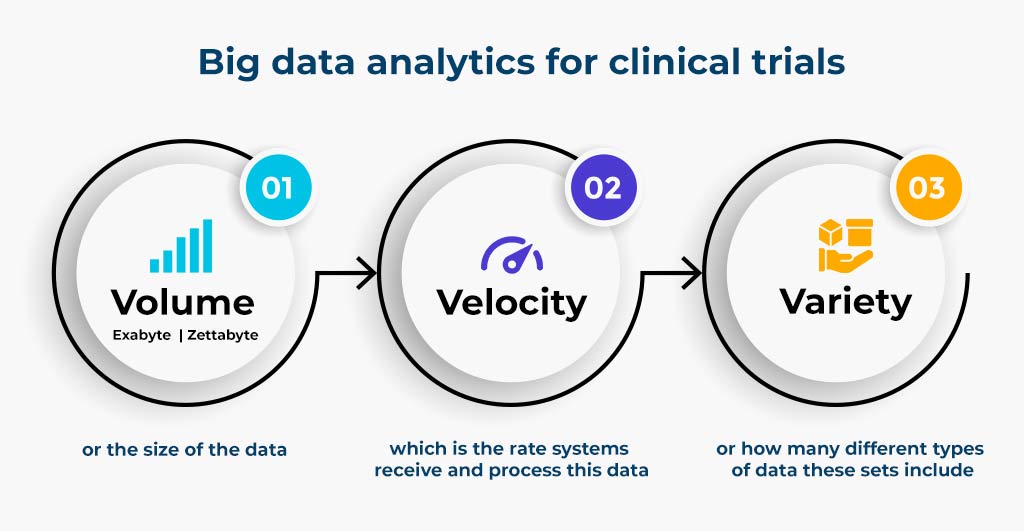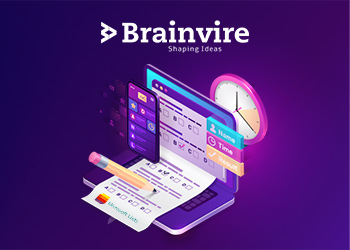Industry after industry has been completely transformed by data analytics, and the healthcare sector stands to benefit more than others. Predictive analytics in clinical trials is one of the most useful applications of data technologies in the market.

Machine learning algorithms are used in clinical trial analytics to uncover new information in the trial data. Pharmaceutical companies are held to high standards because these clinical trials are so important to the discovery of new drugs, the testing of new products, and patient health. Meeting those expectations is made significantly easier by data-driven insights.
What is clinical trial data analytics?
Clinical trial analytics are applied in medical enterprises in various ways. To model how different patient classes will respond to different medications, they occasionally use predictive analytics services. By establishing benchmark expectations and assisting researchers in improving their products before to clinical trials, these insights can direct actual studies. Machine learning algorithms are used in clinical trial analytics to uncover new information in the trial data. Pharmaceutical companies are held to high standards because these clinical trials are so important to the discovery of new drugs, the testing of new products, and patient health. Meeting those expectations is made significantly easier by data-driven insights.
Clinical trial analytics are applied in medical enterprises in various ways. To model how different patient classes will respond to different medications, they occasionally use predictive analytics services. By establishing benchmark expectations and assisting researchers in improving their products before to clinical trials, these insights can direct actual studies.
Before evaluating medications on humans, regulatory organisations conduct clinical studies on animals to make sure they are not hazardous. In these clinical studies, predictive analytics can be used to examine the outcomes of animal experiments and foresee how similar circumstances might develop in human patients.
In other instances, clinical trial data analytics is used by medical institutions to identify research participants. Electronic health records (EHRs) are scanned by artificial intelligence (AI) algorithms to identify individuals who would be suitable test subjects for a certain drug or product.
The benefits of data analytics for clinical trials
Regardless of the exact use case, clinical trials can benefit greatly from predictive analytics. Here are a few of the most significant benefits that using these technologies can bring to healthcare organizations.
Increasing trial efficiency
Clinical trial analytics’ ability to expedite the procedure is one of their main benefits. Four clinical trial phases, some of which might last up to four years and involve thousands of people, are necessary for drug development initiatives. Clinical trial predictive analytics can help companies move through these stages more quickly, but they cannot enable them to skip these phases.
One of the most time-consuming yet unproductive components of the process is locating study volunteers. For trials to produce valid results, volunteers must be willing, represent a sufficient variety of demographics, and have a range of health issues. By manual means, it is difficult to find and contact enough volunteers who fulfil all those characteristics, but AI can accomplish so quickly.
By modeling results, predictive analytics in clinical trials might further streamline the procedure. Before beginning a new trial phase, AI models could forecast adverse effects, therapeutic efficacy, pharmaceutical interactions, and more. Despite having fewer real-world examples, these insights can satisfy regulatory agencies and investors sooner, assisting pharmaceuticals in moving through the phases more swiftly.
Reducing the cost of clinical trials
Predictive analytics for clinical trials also reduces the price of creating new drugs or medical devices. A drug’s development can cost more than $2 billion, with trial-related costs accounting for a large portion of this. Software for clinical trials that analyses data speeds up processes, avoids mistakes, and eases administrative costs.
These companies pay less on ongoing costs per medicine as a result of the clinical trial phases being streamlined by machine learning and AI. Shorter deadlines often result in speedier returns on investment (ROI), which helps cover any costs that are incurred. Early encouraging outcomes from analytics models may also aid to draw in further funding.
By foreseeing trial outcomes and unfavourable events before beginning real-world trials, data analytics also lowers expenses. Drug developers can address these concerns prior to human drug testing because these predictive models can identify adverse events and reactions before they happen. Because fewer unexpected problems will likely arise during clinical trials, the expense of fixing them will be reduced.
By automating administrative and research tasks, data analytics in clinical trials boosts productivity on a smaller scale. Researchers are able to do more at once as a result, making the most of their ongoing costs.
Enhancing clinical results
The enhancement of patient outcomes is a noteworthy benefit of clinical trial predictive analytics. Before pharmaceuticals or products enter human trials, these algorithms can identify possible problems, preventing harmful side effects. Predictive modelling can show how individuals may respond to different medications even before that point, assisting researchers in discovering the most efficient treatments earlier.
In a fraction of a second, machine learning algorithms can try millions of options. Pharmaceutical companies can test novel medications or develop existing ones quickly enough to showcase the most promising candidates. They will be confident that these medications will be highly effective by the time they submit them for human trials.
Big data analytics for clinical trials
At almost any size, predictive analytics in clinical trials is advantageous, but Big Data enhances these advantages. The same principles underlie big data analytics for clinical trials, but far larger datasets are used to generate predictions. In three crucial areas, these datasets are superior than conventional data management solutions:

Handling of data
Big data analytics provide an advantage over traditional analytical techniques in clinical trials because of these three features. Analytical models are able to anticipate outcomes more accurately as more data is added at faster rates and spanning a wider range of information kinds. Variety, the third aspect, is crucial in this situation since clinical trial researchers need to make sure their treatment works for people with all diseases and demographics.
Predictive analytics in the pharmaceutical sector are accelerated and improved by big data. These datasets may be more challenging to collect and analyze, but they provide advantages that are hard to ignore. Medical organizations can employ them to advance their predictive models if they have the necessary resources.
Healthcare predictive analytics examples
Although the use of predictive analytics in business is already pretty common, it is still rather new in the field of healthcare. Despite its youth, case studies from the real world already show how these data technologies might enhance clinical trials.
The COVID-19 pandemic has provided some of the most current and spectacular use cases of data analytics for clinical trials. Machine learning was utilised by the Johnson & Johnson COVID vaccine creators to anticipate future outbreaks that would make excellent testing grounds. They were able to find test subjects for their vaccine trials as a result, hastening the process of development.
In order to create its COVID-19 vaccine, Moderna also used AI data analytics. To select the best potential vaccine candidate, Moderna researchers tested about 1,000 mRNA sequences per month using predictive models. As a result, the corporation was able to quickly launch a shot that was incredibly effective.
Overview of clinical trial predictive analytics
Predictive analytics in clinical trials needs to take certain things into account, just like many other healthcare IT solutions. Medical businesses must acknowledge and take into account the limits of predictive analytics in order to use it successfully because no technology is flawless. Here are a few of these factors for clinical trial predictive analytics that are most important.
Security and confidentiality
Security is one of the most crucial aspects of these medical technology to take into account. The use of machine learning systems necessitates a large amount of data. Companies must take significant measures to secure this information because it is frequently extremely sensitive in the medical industry.
Pharmaceutical firms are held to rigorous levels of cybersecurity and data protection by laws like the Health Insurance Portability and Accountability Act (HIPAA). That becomes more difficult when EHRs and other sensitive data are gathered and stored in one location for data analytics. These machine learning databases may be attractive targets for thieves due to the abundance of health information they contain.
Given the breadth of these databases, a single compromise may provide hackers access to the medical history of thousands of people. In addition to impinging on these individuals’ privacy, that would result in costly fees and mediation expenses for the business.
Clinical trial databases should use cutting-edge security techniques like automated monitoring and zero-trust design in light of these threats. Another way to protect patient privacy is to purge data of any personally identifying information (PII) before feeding it to prediction algorithms.
Biassed algorithms
AI bias must be taken into account by medical companies using data analytics in clinical trials. Although this technology isn’t inherently biassed, during training, machine learning can reinforce ingrained historical and cultural biases.
By mistakenly feeding predictive models EHRs from primarily Caucasian patients, developers run the risk of creating models that are less accurate when predicting health outcomes among persons of colour. These mistakes can be challenging to spot, but if data scientists don’t spot and correct them very away, machine learning models might become biassed very quickly.
Pharmaceutical companies must first understand how these biases can develop in order to prevent this from happening. Then, to make sure they don’t unintentionally foster these biases, they should frequently assess their data collecting and model training methods.
Technical proficiency
Another major barrier is a lack of experience with these technologies. Despite their extensive knowledge, medical professionals lack data science expertise. As a result, they could not understand how to create and use analytics models successfully.
Thankfully, it’s not too difficult to resolve this problem. Clinical trial researchers can learn about data science principles and best practises from medical organizations that offer upskilling and reskilling programmes. As an alternative, businesses can contract with organizations with in-depth industry knowledge to handle the most technically challenging analytics operations.
Additional applications of prediction in healthcare
Predictive modelling can be a ground-breaking tool for the medical industry if these elements are carefully taken into account. Unsurprisingly, other areas of the healthcare industry can also benefit from these wide advantages.
Improved medical treatment
Predictive analytics can be used by medical researchers to track the state of the world’s health. Machine learning is excellent at identifying trends to forecast similar circumstances in the future, making it ideal for pinpointing potential outbreak hotspots. The potential of these use cases has already been demonstrated in the real world, as one algorithm identified COVID-19 nine days before the World Health Organization issued its initial report on the virus.
As this technology advances, other applications and advantages will also show up. Implementing data analysis tools could boost the healthcare sector overall.
Clinical trial revolutionized by predictive analytics
Despite being a relatively new approach, predictive analytics in clinical trials has a lot of potential. Medical companies have the potential to alter the sector if they can carefully design and use these technologies. Clinical studies will be more efficient, save more lives, and spend less money.
Related Articles
-
Microsoft Lists-The Brand New Key to Streamline Work
A skilled SharePoint development organization has the caliber to share innovative features of the latest technology and use it for your enterprise. Technologies are getting smarter than humans and hence
-
Driving Collaboration and Productivity with Microsoft 365
Let’s be honest—traditional workplace collaboration is outdated. Remember the days of endless email chains, lost attachments, and frustrating version control issues? In a world where remote and hybrid work is
-
Personalized Data Experiences with Power BI Reports for Multiple Metaverse Avatars
Power BI Reports revolutionizes data visualization by combining analytics with virtual reality. This notification improves communication and transforms the Metaverse landscape by providing unique insights for avatars. In addition to



